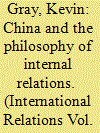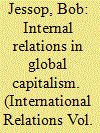| Srl | Item |
| 1 |
ID:
178135


|
|
|
|
|
| Summary/Abstract |
Bieler and Morton’s Global Capitalism, Global War, Global Crisis makes an important and timely contribution to the academic study of the international political economy.1 Based on the philosophy of internal relations, the book seeks to challenge the ‘ontological exteriority’ that is typically posited between key elements of the international system, such as ideas, the social relations of production, the workplace, the ‘social factory’, and the market, state and inter-state system. While the authors draw on a range of theoretical resources and approaches, it is the historical materialism of Antonio Gramsci that provides the key intellectual resource for the numerous theoretical interventions made in the book. For example, Gramsci’s critique of economism and statology provides the basis of an insightful intervention into the structure-agency debate by emphasising the intersections between the social relations of production and class struggle. Gramsci’s theory of hegemony and the integral state, on the other hand, provides the basis of an understanding of the material structure of ideology. As such, Bieler and Morton further strengthen the case for the relevance of Gramsci’s writings not just for the field of International Political Economy but for social theory more broadly.
|
|
|
|
|
|
|
|
|
|
|
|
|
|
|
|
| 2 |
ID:
178129


|
|
|
|
|
| Summary/Abstract |
Global Capitalism, Global War, Global Crisis seeks to overcome ontological and epistemological challenges to studying various aspects of the emerging global order in their interconnection.1 Its authors’ theoretical approach develops the philosophy of internal relations to understand the interaction of economic, political, military and social institutions, practices, and conflicts from the viewpoint of a comprehensive analysis of the uneven and combined development of capital relation on the world stage and its connection to forms of class struggle, broadly interpreted. This stresses the continued importance of the state form as nodal within global capitalism.2 My critique is based on an emerging post-disciplinary approach, cultural political economy, to which the Bieler–Morton approach has strong affinities.
|
|
|
|
|
|
|
|
|
|
|
|
|
|
|
|